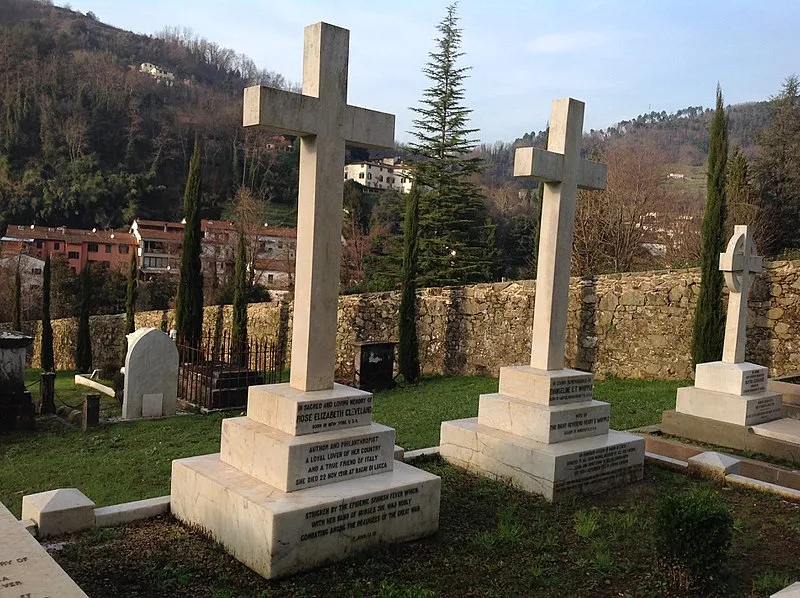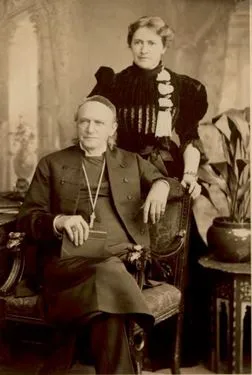New Book Chronicles First Lady Rose Cleveland’s Love Affair With Evangeline Simpson Whipple
Rose and her longtime partner are buried side by side in the Italian town where they once shared a home
/https://tf-cmsv2-smithsonianmag-media.s3.amazonaws.com/filer/6c/d6/6cd6518e-0cf5-48de-b96e-d2e288916c3e/evangeline_simpson_whipple_cropped_copy.jpg)
In the winter of 1889, former First Lady Rose Cleveland crossed paths with a younger widow named Evangeline Simpson while vacationing in Florida. The pair soon embarked on a passionate love affair, exchanging letters dripping with sensuality—Rose once wrote, “My Eve! Ah, how I love you! It paralyzes me. ... Oh Eve, Eve, surely you cannot realize what you are to me,” while Evangeline implored “my Clevy, my Viking, My … Everything” to “come to me this night”—traveling together to far-flung locales such as Europe and the Middle East, and even co-purchasing a property in the state where they first met. Upon Evangeline’s death in 1930, 12 years after her longtime partner’s passing in 1918, the two were buried side by side in their shared home of Bagni di Lucca, Italy.
As Gillian Brockell reports for the Washington Post, Precious and Adored: The Love Letters of Rose Cleveland and Evangeline Simpson Whipple, 1890-1918, a new book co-edited by Lizzie Ehrenhalt and Tilly Laskey, offers the first in-depth overview of the couple’s story, drawing on correspondence held by the Minnesota Historical Society to present an intimate glimpse into their 30-year relationship.
The letters, donated to the society by a descendant of Evangeline’s second husband, Bishop Henry Whipple, in 1969, were initially hidden from the public on the grounds that they “strongly suggest … a lesbian relationship existed between the two women.” Following complaints, however, the missives returned to public view and, over the following decades, were referenced in various historical accounts of the pair’s lives. Until now, Brockell notes, the writings have never before been published in their entirety.
Rose, sister of President Grover Cleveland, held the position of first lady for the first 14 months of her brother’s initial term. (Cleveland, who assumed office as a bachelor, is the only United States president to serve two non-consecutive terms; he served from 1885 to 1889 and from 1893 to 1897.) According to the National First Ladies’ Library, she was a serious intellectual, publishing several books during her time in the White House and even was known to conjugate Greek and Latin verbs in her head while attending tedious public functions.

At the end of her tenure, Charles Lachman writes for the Daily Beast, Rose “departed Washington as she had arrived—an enigma” with little care for the fashion trends and social conventions typically followed to the letter by women of her station. As Rob Hardy noted in a 2007 article for the New England Review, “It must have been a relief [for Rose] when her brother finally married” his 21-year-old ward, Frances Folsom, releasing his sister from her duties and freeing her to pursue other aspirations.
Evangeline was the wealthy widow of a man nearly five decades older than her. She and Rose enjoyed an instantaneous connection, beginning a correspondence relationship as soon as they returned to their respective homes in April 1890. While Evangeline’s letters to Rose no longer survive, those include several equally impassioned quotes taken from her partner’s notes.
The women “corresponded across states and continents, discussing their advocacy and humanitarian work—and demonstrating their sexual attraction, romance, and partnership,” Minnesota Historical Society Press Editor-in-Chief Ann Regan explains to Muri Assunção of New York Daily News.
Ehrenhalt, co-editor of the new collection of letters, tells the Post’s Brockell that the pair lived “before there was a concept of sexual orientation [in] the way that we know it today.” Rose herself had trouble articulating their relationship, once writing, “I cannot find the words to talk about it.”
So-called “romantic friendships,” encompassing emotionally and intellectually intimate but not necessarily sexual relationships, were common among women at the time. But as American historian Lillian Faderman points out in Odd Girls and Twilight Lovers: A History of Lesbian Life in Twentieth-Century America, few were as unabashedly candid as Evangeline and Rose; in one letter, for instance, Rose made reference to the “long rapturous embraces [that] carry us both in one to the summit of joy, the end of search, the goal of love!”

The relationship continued until 1896, when Evangeline unexpectedly married her second husband, Bishop Whipple, despite Rose’s ardent pleas to the contrary: “I will give up all to you if you will try once more to be satisfied with me.” Although the two continued to exchange letters during the duration of Evangeline’s marriage, the notes lost their tone of intimate affection. Then, in 1901, Whipple died at the age of 79, paving the way for Evangeline and Rose to come together again.
According to Brockell, the pair lived separately for the next nine years, visiting each other for extended periods of time but maintaining homes in separate states. In 1910, they moved to Italy to take care of Evangeline’s sickly brother, and upon his death in 1912, settled down, “finally as true partners,” in the Tuscan village of Bagni di Lucca.
“I do think they associated with Italy a kind of romantic idea of freedom to love, freedom to have a relationship without people getting in your business,” Ehrenhalt explains to Brockell.
Rose died on November 22, 1918, after contracting the Spanish flu while taking care of a sick friend. Evangeline, who later published a history of Bagni di Lucca dedicated to her longtime partner, wrote to her stepdaughter of the “blow that I shall not recover from,” adding, “The light has gone out for me.” Evangeline died of pneumonia and kidney failure 12 years later. She and Rose are buried next to each other in the Italian town’s graveyard, where their resting places are marked by identical monuments.
/https://tf-cmsv2-smithsonianmag-media.s3.amazonaws.com/accounts/headshot/mellon.png)
/https://tf-cmsv2-smithsonianmag-media.s3.amazonaws.com/accounts/headshot/mellon.png)